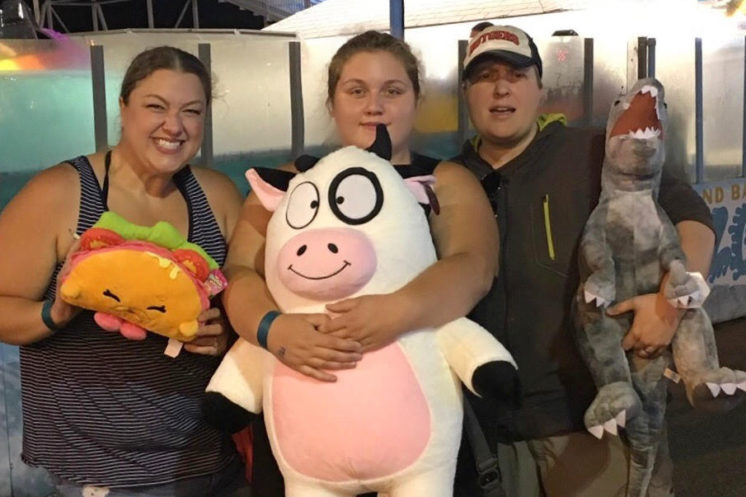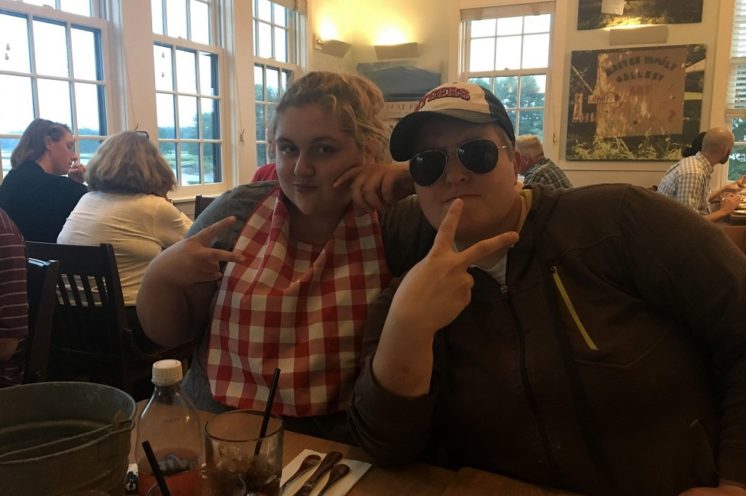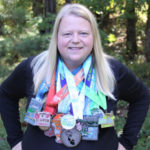Your Team!
 My aunt Meda died and I felt nothing. I was completely numb. Probably shell shocked, to be honest. I flew to New Jersey to be with her widow — aunt Maren — and my grandma, who lived with them at the time. I tried to help around the house, feeling nothing more than a dull ache that seemed wrong for the situation. I thought I was a sociopath, the pain not substantial enough for the tragedy.
My aunt Meda died and I felt nothing. I was completely numb. Probably shell shocked, to be honest. I flew to New Jersey to be with her widow — aunt Maren — and my grandma, who lived with them at the time. I tried to help around the house, feeling nothing more than a dull ache that seemed wrong for the situation. I thought I was a sociopath, the pain not substantial enough for the tragedy.
The hurt hit me like a tidal wave when I stood in the TGI Fridays bar where Meda worked. I was helping to prepare the celebration of life when the realization set in that I would never see my fun, erratic, loving aunt again. The woman who welcomed her wife’s weird niece into her home for the summer months. The woman who loved pugs more than anything. The woman who was called “sir” at drive-throughs on multiple occasions when lowering her voice to try to sound cooler.
I cried when I heard Adele’s 21 for the first time after she died, knowing Meda had cultivated my love for the album.
Grief is a terrible, horrible, no good, very bad time.
Meda came into my life when she married my maternal aunt, Maren. They were the couple everyone wanted to be around. They offset each other perfectly; Maren was the adult, while Meda often acted like a teenage boy who never quite made it out of the “your mom” stage of jokes. We loved her for that.
I don’t want to get too far into stories about Meda, because this essay is about the journey of grief following loss, but it’s difficult to separate one from the other when they’re so interwoven with each other. Compare it to untangling Christmas lights wound up into a ball, or getting your earbuds unknotted after putting them in your pocket. If you’ve lost someone close to you, you’ll know what I’m talking about.
Meda passed unexpectedly in 2018. She was only 36 years old. In my experience, as someone who has lost both young and old people, it’s much easier to process the death of a loved one when there’s already an expectation of death on the horizon. Losing someone so young to something preventable is heart-wrenching, gut-aching, and just downright unfair.
The months that followed were life changing for me. I graduated from high school without her cheering me on in the bleachers. I moved away from home to Duluth without her laughing voice encouraging me on my lonely days. The grief caught up to me. I suffered intensely not being able to talk with anyone in my family about Meda and the stories surrounding her, terrified I’d set someone into a spiral. It never occurred to me that I had set myself into a spiral by bottling it up. I developed an intense anxiety that caused me to become incredibly overbearing on my loved ones, afraid that I would lose them at the drop of a hat. It grew into a massive beast that extended into every part of my life. I pushed people away from me, afraid if I let them get close and I lost them, I would be sent back into grief time-out. This eventually came to a head and I decided it was time for a change.
I sought help from professionals in late 2020, right at the start of my junior year at the University of Minnesota Duluth. My therapist has helped me unravel the issues I still face daily, pushing me to be my best self and not let my grief keep me in a chokehold. With both counseling and trials of medication (this isn’t always a quick fix!), my life feels fulfilling again and I feel like I can breathe comfortably for the first time in a long time. It took three years of suffering and helplessness to find my whole happiness again, but I came out on the other end kicking.
I’ve learned from my work in therapy that sharing enjoyment for things the dearly departed had love for can be incredibly healing. Meda loved dumb jokes, ironic humor, and everything of the like. I’ve carried on her legacy by collecting silly lighters I find at gas-station counters, most recently a Bic model with the image of a turkey on the front and one with a squirrel with text that reads, “you go squirrel!” I try to use the humor she taught me, coming up with fun facts that make no sense, stating them in a confident tone. “Did you know that’s where George Washington had his first kiss?” is a PG version of something she said once. She had a way of making you laugh until you cried or your stomach cramped.
Meda loved to point out strange people on the streets and designate them to “your team!” What the “team” was supposed to consist of was left open to interpretation. All you need to know is that the guy in a tuxedo juggling rubber chickens on the fishing pier is on “your team.”
I know that Meda would be cackling from the great beyond knowing her lively personality lives on in the people she touched. She was one of a kind, but I’ll keep looking for others who might be like her — people who might be on her team.
Before I let you go, I want to make one thing clear: grief processing takes time and effort. It’s not an overnight cure, but a long-term commitment to your own healing process. You will forever have a hole where that being once was. However, consider the healing as a way to fill the hole inside with flowers instead of cobwebs. Time may not heal all, but it sure does make the pain less painful, take it from me.
If you or someone you know is suffering from either grief or loss, please know that you are not alone. You are not crazy. There’s nothing wrong with the way you’re feeling. It’s okay to ask for help. It’s okay to let someone shoulder some of the weight you carry. I promise that you’ll be better for it.
National Suicide Prevention Lifeline – 1-800-273-TALK (8255)
Crisis Text Line – text TALK to 741741
Recommended Links:
Leave a Comment
Only registered members can post a comment , Login / Register Here
















1 Comment
FranceneStarr
about 4 years ago